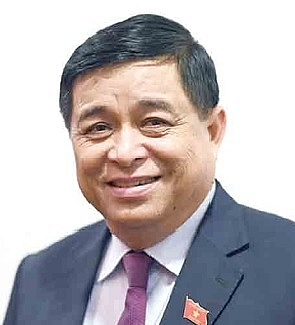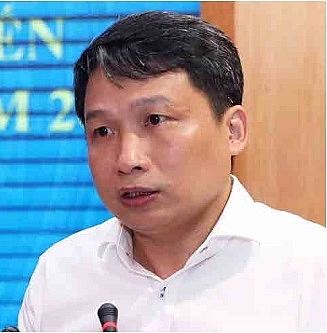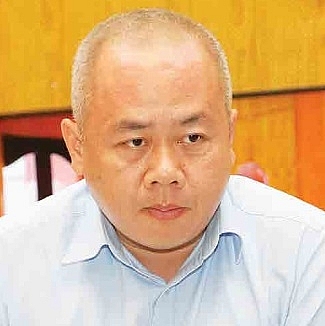Tran Quoc Phuong, Deputy Minister of Planning and Investment, discussed the future key tasks and varying solutions required in order for the country to achieve its yearly targets.
 |
|
Tran Quoc Phuong, Deputy Minister of Planning and Investment
|
A number of challenges were raised at the Ministry of Planning and Investment’s (MPI) online meeting with all cities and provinces on July 28 amid the new developments of COVID-19 in the country. What are the MPI’s policy scenarios for the upcoming months to ensure economic recovery, thus meeting the highest possible economic growth for 2020?
Recent COVID-19 cases in the central city of Danang have made people concerned. At present, ministries and agencies at all levels, especially the National Steering Committee on COVID-19 Prevention and Control, have taken bold actions to effectively control the situation to prevent a new outbreak of the health crisis in the community, thus easing negative impacts of the pandemic on the ongoing economic recovery for the second half of the year.
The MPI has resumed all works on making reports and building possible scenarios, as well as making necessary proposals and solutions as we did in the first half of the year to give advice to the government in socioeconomic steering works to enable the economy to meet the yearly targets as much as possible.
People have often talked about an adaptive economy. Has Vietnam developed such a thing during COVID-19?
An adaptive economy is a new concept that requires deep study to find appropriate solutions. The pandemic has serious impacts on people’s lives and economic activities. Thus, it is not easy for a country to achieve. Many countries have only just approached the new concept, and none claims to have their own adaptive economy.
Economies are struggling with the rapid developments of COVID-19, but an adaptive economy has been discussed for some time, such as for climate change, or for other specific conditions.
Many struggles may be ahead, so what are key tasks and solutions that the MPI will give priority to for its performance in the second half of the year?
To fulfil the targets, the ministry will continue to make reforms and innovations while taking concrete actions, focusing on the several major tasks and solutions.
First, we will closely work with ministries, agencies, and localities on supervising socioeconomic development at home and abroad, make forecasts, and give timely advice to the government and prime minister about possible solutions for their monitoring and directing, thus enabling the country to meet the set targets.
Moreover, we will focus on synchronous and strong implementation of strategic breakthroughs, and study policies and mechanisms to mobilise and effectively use all resources for business activities and investment development. The MPI will focus on the implementation of new legislation including the Law on Investment, the Law on Enterprises, the Law on Public-Private Partnership, and the Law on Planning, while proposing solutions to uphold the role of economic hubs, growth areas, and major urban areas.
The MPI will collaborate with ministries, central-level agencies, and localities in building reports such as those on socioeconomic development in 2020 and the development plan for 2021; the report on review of the 2016-2020 socioeconomic development plan and the 2021-2025 development plan; and another on review of the government’s action plan to fulfil the 2016-2020 socioeconomic development plan and the threshold for the 2021-2025 period.
Also importantly, as leader of the government’s macroeconomic executive team, the MPI will work closely with the Ministry of Finance, the Ministry of Industry and Trade, and the State Bank of Vietnam on supervising regional and global developments, as well as possible policy changes of economies, thus making forecasts and proposing appropriate policies and solutions to take the initiative in all cases.
Regarding public investment, a number of solutions will be taken to spur the disbursement process, while focusing on building the mid-term public investment plans for the 2021-2025 period.
The MPI will concentrate on three national strategies, six master plans, one law, four decrees, and 10 major reports. They include the national strategy on foreign investment cooperation during 2021-2030; the strategy on service development master plan during 2021-2030 with a vision towards 2050; and another on green growth in the 2021-2030 period.
The six master plans will focus on application of modern administration of state-owned enterprises; criteria on foreign investment attraction, and the others on assessment about efficiency of foreign investment; and management and use of official development assistance and preferential loans until 2025.
Meanwhile, the decrees include one on amending business registration, a second on amending the regulations on outbound investment, and one amending the rules on management of industrial parks and economic zones, among others.
|
Nguyen Chi Dung - Minister of Planning and Investment
During the first half of 2020, Vietnam achieved positive and impressive growth in economic development. However, challenges in the remaining months still exist and even grow fiercer, especially after the new infections were found recently in the central city of Danang. Therefore, the government has outlined solutions for socioeconomic growth. Facing the serious development of the pandemic, the ministry keeps monitoring and building up related policies to submit to the government. Those include the Resolution No.42/NQ-CP stipulating aid for people who have suffered difficulties due to the pandemic, Resolution No.84/NQ-CP outlining duties and solutions to ease burdens for manufacturing activities, accelerating the disbursement of public investment capital, and ensuring the political and social safety amidst the health crisis, among others. Regarding the implementation of the middle-term investment plan and also the Law on Public Investment, the ministry focuses on stimulating the capital disbursement to support economic growth. Regarding the management of official development assistance (ODA) and soft loans of foreign sponsors, the ministry has developed and submitted the related documents related to the government. Those include Decree No.56/2020/ND-CP providing regulations on managing and utilising the assistance from non-governmental organisations. Moreover, the ministry will continue to draft a decree regarding Vietnam’s assistance for foreign countries and the plan for attracting, managing, and utilising ODA and overseas soft loans in the 2021-2025 period. The ministry has also been carrying out plenty of solutions to boost the disbursement of ODA and foreign soft loans during the last half of 2020. Tran Duy Dong - Director, Department of Local and Territorial Economy
The global economy is facing a deep recession. Meanwhile, the domestic economy continues in be in the doldrums due to the pandemic’s implications with unpredicted proceedings. Therefore, central tasks are to craft a public investment plan for the 2021-2025 period, prudently working on another one for 2021, and push disbursement of public investment capital to quickly resume economic development in the ‘new normal’. Both of these plans must be crafted seamlessly, taking into account experiences from the implementation of the previous plans to ensure optimal efficiency. With regards to capital allocation for investment preparation, the lessons drawn from building a medium-term public investment plan during 2016-2020 show that projects with capital allotment prior to working on investment preparation have a better quality with quicker disbursement in place, with little requirements for project adjustment. Localities, therefore, must take the initiative in capital allocation right from 2021 so as to effectively conduct investment preparation as well as select suitable projects matching the planning scheme with connectivity and interregional impacts to push up quick and sustainable socioeconomic development. Dinh Trong Thang - Director, Department of Planning Management
Aware of the importance of planning activities as noted in the regulations on planning, the ministries, sectors, and localities have focused on making planning at all levels, including the three national plannings, 39 national-level sectorial ones, and 63 municipal and provincial ones for the 2021-2030 period with a vision toward 2050. The ministries, sectors, and localities have been gradually aware of the importance of building and overseeing the implementation of planning schemes to orientate space disposition and pen out sector-based development policies in their territory to ensure rational and effective exploitation of resources. From there, they are able to push socioeconomic development in quickly and sustainably. Generally, the ministries, sectors, and localities are very proactive in simultaneously drawing planning schemes for the period 2021-2030 in accordance with the national planning system. One hurdle is that the national database on planning has yet to be fully and synchronously developed, causing a lack of information in the process of drawing and overseeing the planning implementation. Do Thanh Trung - Director, Department of National Economic Issues
With strict adherence to the government’s guidance throughout 2020 as well as the action programme for the 2016-2021 period, in the second half of this year, the MPI will further promote its innovative spirit and take drastic actions for the successful accomplishment of assigned tasks noted in resolutions of the Central Party Committee, the National Assembly, the government, as well as the instructions from the prime minister. Some major tasks involve taking the initiative cooperating with relevant ministries and central and local agencies to keep close tabs on the socioeconomic situation, domestically and internationally; working on summarising, analysing, and forecasting to timely consult the government and the prime minister in regards to management solutions, striving for completion of all targets and plans set for 2020. Meanwhile, the MPI will focus on ensuring radical and consistent implementation of strategic breakthroughs, pared with studying the mechanisms and policies to effectively mobilise and use diverse resources for investment development and the business community. VIR |
Bich Thuy
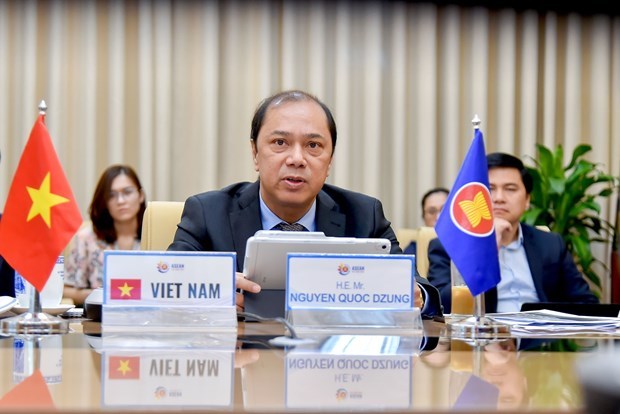
Vietnam proposes post-pandemic recovery measures in ASEAN
Deputy Minister of Foreign Affairs Nguyen Quoc Dung, head of Vietnam’s SOM ASEAN, attended an online high-level dialogue on ASEAN’s recovery post-COVID-19 on July 30.
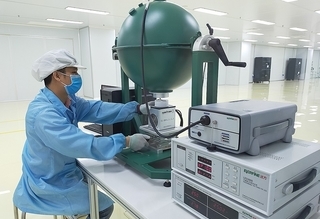
Economic recovery faces uphill battle
The aftermath of the global health crisis may drive Vietnam to a lower-than-expected economic growth landscape, challenging the government’s efforts to revive the economy and restore production.
